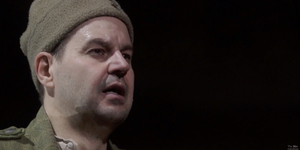Review Roundup: WOZZECK At The Metropolitan Opera- Read The Reviews

Music Director Yannick Nézet-Séguin leads a brilliant new staging of Berg's masterpiece by William Kentridge, starring Peter Mattei and Elza van den Heever. On stage through January 22.
After wowing audiences with his astounding production of Lulu in 2015, South African artist William Kentridge now focuses his extraordinary visual imagination on Berg's other operatic masterpiece, set in an apocalyptic pre-World War I environment. Met Music Director Yannick Nézet-Séguin is on the podium for this important event, with baritone Peter Mattei making his highly anticipated role debut as the title character. Soprano Elza van den Heever is Wozzeck's unfaithful mate, and the commanding cast also includes tenor Christopher Ventris as the Drum-Major, bass-baritone Christian Van Horn as the Doctor, and tenor Gerhard Siegel as the Captain.
World Premiere: Staatsoper, Berlin, 1925. One of the emblematic achievements of the thriving artistic forces in Germany and Austria during the brief period between world wars, Wozzeck was a sensation and a scandal at its premiere. Remarkably, it has lost none of its power to fascinate, shock, and engage audiences, and its status as one of the defining musical works of the 20th century has not blunted its vitality.
Anthony Tommasini, The New York Times: Yet this time of year is also a moment to take stock. And few works look at life with more searing honesty than "Wozzeck." The issues that drive this wrenching, profound opera are especially timely: the impact of economic inequality on struggling families; the looming threats of war and environmental destruction; the rigid stratification - almost the militarization - of every element of society.
George Strella, New York Classical Review: William Kentridge's new production, which opened Friday at the Metropolitan Opera, has lit the fuse and burst open any artifice or phoniness. This staging, with the great baritone Peter Mattei in the lead role, presents the ugliness that Berg saw during his WWI experience and translated through his score. Wozzeck is not the usual kind of pleasure; it is beautifully made but not beautiful-honest and sincere about ugly and upsetting things, it shows people in extremis without making their anguish into something musically glorious.
James Jorden, Observer: To be sure, it feels a little odd to call a performance of so downbeat a piece a triumph, but that's exactly the right word to describe Yannick Nézet-Séguin's leadership of this production's enormous musical forces including the Met Orchestra. The conductor's reading was fleet and crystalline, leaning toward a cool "modern" clarity instead of the heavier, more romantic take more traditional at the Met until now.
David Salazar, Opera Wire: You definitely come away with the feeling of depravity in the work; you feel the hardship of the impoverished world that Wozzeck and his community lives in; but it all flies by so quickly that you can't really take in all of the other grace notes and symbols layered throughout. While this is a short opera that packs a lot of action in its short span, Wozzeck does allow for moments of reflection where you can engage with some of the philosophical and emotional discourse taking place between the characters. The previous Met production, with its minimalism, undeniably allowed for this kind of interaction with the opera.
David Patrick Stearns, The Philadelphia Inquirer: This new production, which opened Friday, is the high-prestige item of the season: Besides being an acclaimed artist, Kentridge had past productions of Lulu and The Nose that were breakthroughs amid the Met's fitful struggle to join the 21st century of director-driven productions in ways that connect with conservative Met patrons and cultivate new audiences. This dense, intermission-less, 90-minute Wozzeck was expressively focused yet expansively utilized a range of images and sound that allowed no escape.
Reader Reviews

Videos

